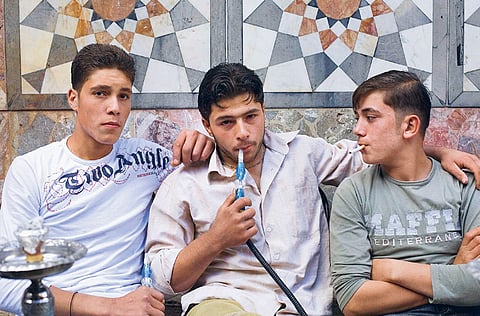It's going to be tough to take a puff in the Mideast
Those stuck with their cigarettes on April 21 will have to confine themselves to designated smoking zones

Damascus: Syria's long-awaited smoking ban goes into effect on April 21 with a six-month grace period drawing to a close. President Bashar Al Assad had officially approved the new rules back in October 2009. The smoking ban builds upon an earlier decree passed under Syria's late president Hafez Al Assad in the 1990s, which had banned the advertising of any tobacco-related products in Syria.
Health Minister Rida Said defended the ban saying it "protects the rights of non-smokers, many of whom are children, and is an important step towards reduction of smoking-related illness".
Video: Smoking in public:
Hailed by non-governmental organisations (NGOs) and civil society, and frowned upon by smokers and restaurant owners, the ban has been gradually phased in after being first mooted in 2009.
It began with smoking being banned in all government offices and public buildings, and a fine of up to 500 Syrian pounds (Dh38.9) being levied on those caught smoking in modes of public transport like buses, trains, or taxis. A 10 per cent increase in the price of cigarettes was also part of the campaign.
New rules
It has now been stipulated in Article 5 that only cafes with designated outdoor spaces or specified levels of indoor ventilation can allow customers Turkish pipes or smoking zones. Smoking in any form at any restaurant or cafe is otherwise strictly forbidden.
The new rules also place restrictions on Turkish pipes, saying that under no circumstance can they be offered to those below the age of 18. Restaurants and hotel owners breaking the ban will be fined up to 40,000 Syrian pounds for every violation, while smokers breaking the law stand to lose up to 5,000 Syrian pounds.
Several private sector institutions have itched on to the campaign. Forward Magazine, a monthly English publication, has launched a special awareness section titled ‘Smoking Kills' while the University of Kalamoon, Syria's largest private university, declared all of its buildings, smoke-free.
The Syrian Research Centre for Smoking at Damascus University had in 2006 published statistics showing that Syrians indulge in some 10 million cigarettes on a daily basis, putting the annual consumption at 3.6 billion cigarettes. Editorials in the Syrian press have for weeks been reminding smokers of the health implications of the habit, while Syria's highest religious authority, Grand Mufti Ahmad Hassoun, passed a recent edict claiming that the purchase and sale of tobacco products, or renting shops for the purpose, was frowned upon in Islam.
According to the General Organisation of Tobacco, smokers in Syria spend $600 million (Dh2.2 billion) per year on tobacco products, which in the equivalent of 8 per cent of their income. Some 15 per cent of Syria's population of 23 million are regular smokers, while up to 98 per cent are affected by second-hand smoke.
Additionally, the Syrian Society for Countering Cancer says that 60 per cent of adult males and 23 per cent of adult Syrian females are registered smokers. These are alarming numbers which no doubt strengthened the government's will to press ahead with a smoking ban.
Abdullah Hajjar, a member of the Syrian Association for Combating Smoking, said that soon, the streets of Damascus will be filled with billboards raising awareness about the hazards of smoking and a "hot line" will be allow people to report smoking violations in public places.
The question on everybody's mind is whether the ban will go into effect, given rising resentment among smokers.
Many have already signed up with an "argeelah delivery" service to homes given that they will soon be unable to go to restaurants or cafes to enjoy Turkish pipes and with the realisation growing that they might have to get used to smoking at home.
Currently only one registered company offers this service in Damascus, a city with a population of 5 million. The charge for each Turkish pipe is 250 Syrian pounds.
Asked about the law, restaurant and cafe owners concur that they will abide by the law given that it is a presidential decree that cannot be broken. Other means of luring customers, like live music for example, cheaper prices, or better food, are being considered. Some managements noted wistfully that the "argeelah boom" that had grown on Syrian society in a span of 15 years, is at an end.



